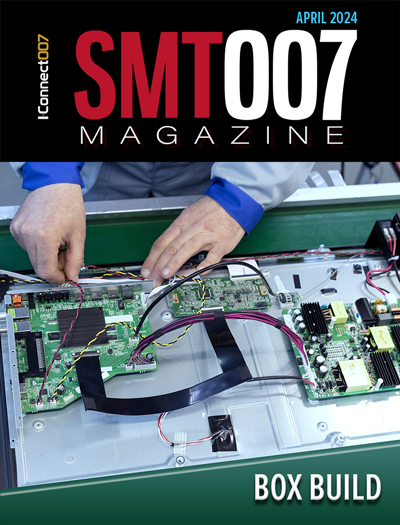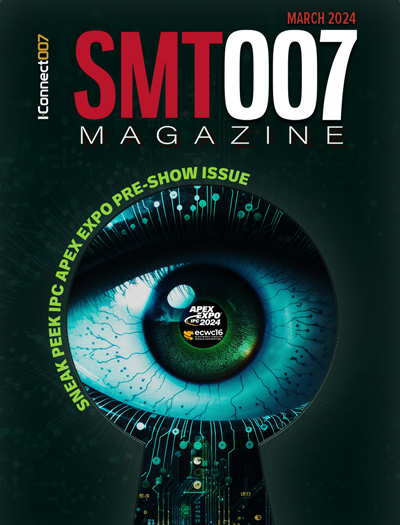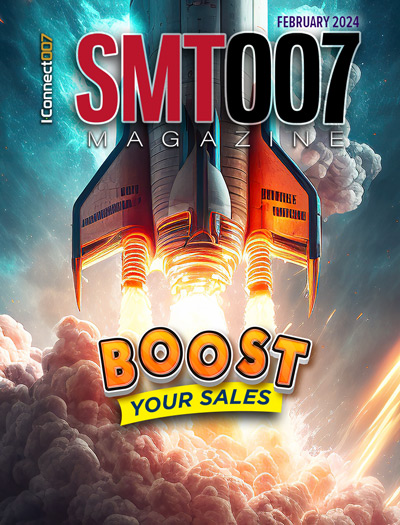-

- News
- Books
Featured Books
- smt007 Magazine
Latest Issues
Current Issue
Box Build
One trend is to add box build and final assembly to your product offering. In this issue, we explore the opportunities and risks of adding system assembly to your service portfolio.

IPC APEX EXPO 2024 Pre-show
This month’s issue devotes its pages to a comprehensive preview of the IPC APEX EXPO 2024 event. Whether your role is technical or business, if you're new-to-the-industry or seasoned veteran, you'll find value throughout this program.

Boost Your Sales
Every part of your business can be evaluated as a process, including your sales funnel. Optimizing your selling process requires a coordinated effort between marketing and sales. In this issue, industry experts in marketing and sales offer their best advice on how to boost your sales efforts.
- Articles
- Columns
Search Console
- Links
- Events
||| MENU - smt007 Magazine
Estimated reading time: 5 minutes
Contact Columnist Form
Standing Room Only at ICT's Winsford, UK Seminar
Spring had almost arrived--the snowdrops and crocuses were in flower and buds were on the daffodils, but it was a dull and drizzly day in Cheshire, UK for the Institute of Circuit Technology (ICT) Winsford Seminar. The event attracted a sell-out audience and it really was standing-room-only in the seminar room.
Technical Director Bill Wilkie introduced a programme of four presentations on a diversity of subjects: Bonding treatment, soldering, trace metal removal, and semiconductor packaging.
Copper surface preparation to achieve reliable multilayer bonding is a critical operation. In high-frequency designs, traditional methods can result in a loss of signal integrity as a consequence of excessive roughening of the copper.
Paul Sevriens travelled from MEC Europe in the Netherlands to describe an improved and simplified process of bonding treatment which gave increased peel strength and improved high-temperature resistance with minimal surface roughening. A key characteristic of the process was the very low thickness of the copper-organic surface layer, typically 3 nanometres compared with 20 nanometres for competitive processes based on benzotriazole or benzimidazole. This very thin layer did not block the surface texture of the etched copper, and when peel-tested left no residue on the copper. MEC has installations in Germany, Italy, Switzerland, England, Netherlands, Sweden, and U.S.
Dr. Andrew Ballantyne had presented at previous ICT seminars on applications of ionic liquids and deep eutectic solvents in metal finishing. The latest line of research at University of Leicester explored the potential benefits of deep eutectic solvents as replacements for conventional soldering fluxes, and impressive results had been observed. Compared with conventional fluxes which relied on acidic activators, those based on deep eutectic solvents had the advantages of benign chemistry, low toxicity and environmental impact, low cost, low water sensitivity, high metal solubility, and less-onerous registration requirements.
After summarising the chemistry and physical characteristics of ionic liquids in general, and entertaining the audience with a live mix-and-shake demonstration of how easily they could be prepared, Dr. Ballantyne reviewed the results of solderability testing on copper, brass, nickel, stainless steel, and cast iron. Although the scope of soldering technology clearly extended far beyond the field of electronics assembly, specific testing had been carried out on a range of PCB finishes including bare copper, OSP, ENIG, immersion silver, immersion tin, tin-lead HASL and lead-free HASL, on surface-mount pads, through-holes and BGA pads, all with satisfactory results and all samples passed contamination testing after normal cleaning.
Page 1 of 3
More Columns from The European Angle
CircuitData: A New Open Standard for PCB Fab Data ExchangeI Never Realised It Was So Complicated!
The European Angle: Institute of Circuit Technology 43rd Annual Symposium
Ventec International Group's Martin Cotton Celebrates 50 Years in PCB Design
Reporting on the Institute of Circuit Technology Spring Seminar
EuroTech: Raw Materials Supply Chain—Critical Challenges Facing the PCB Industry
EuroTech: ENIPIG—Next Generation of PCB Surface Finish
EuroTech: Institute of Circuit Technology Northern Seminar 2016, Harrogate


